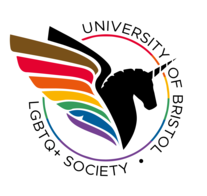Bug Lewins Ktori is the incoming president of the University’s LGBTQ+ society. Having been involved with the society since their first year at the University, they are committed to making sure that all LGBTQ+ students benefit from a sense of community and peer support during their time at Bristol.
We spoke to Bug about intersectionality, peer-support, representation, and their following of the ‘DofE’ approach.
Why is the Q so important in LGBTQ+?

The Q is very important. To me, queer means not fitting in, having parts of yourself that aren’t societally acceptable, not fit
ting into a box that has been assigned to you. It can act as an umbrella for different gender identities and sexual orientations and how they intertwine
with other identities. Having the ability to say I’m queer, I’m one of you without specifically narrowing down to specific letters is important for me.
Also reclaiming the word queer is so empowering, we’re able to take back which was used as a slur and are now able to say this is my identity and I love and am proud of that.
How important is intersectionality to the LGBTQ+ Society?
Our top priority really is intersectionality, because there’s no point making those of us who are more privileged within an underprivileged community feel wonderful, while still excluding an entire underrepresented part of our community, that is already struggling more so you know, as a group that’s supposed to be providing support and community that is one of our biggest focuses.
We have a very diverse committee with a zero-tolerance policy on any sort of discrimination, we also do our best to cater to intersections such as disability and race.
What are your peer support sessions like?
 These sessions run in collaboration with Project:Talk, so any concerns are fed back to them. But we’re very chilled out, we try to make these sessions as unintimidating as possible. We bring a bunch of biscuits, a bunch of colouring books and we chat, we do have some structured questions i.e. names, pronouns etc. but mostly we talk about our days/weeks and natural conversation is sparked from that. And then the rest of it is just kind of almost kind of like hanging out as friends.
These sessions run in collaboration with Project:Talk, so any concerns are fed back to them. But we’re very chilled out, we try to make these sessions as unintimidating as possible. We bring a bunch of biscuits, a bunch of colouring books and we chat, we do have some structured questions i.e. names, pronouns etc. but mostly we talk about our days/weeks and natural conversation is sparked from that. And then the rest of it is just kind of almost kind of like hanging out as friends.
If a student had an issue how would/could the society help?
If a student has an incident or a negative experience, we will escalate this to the SU and the University and discuss formal measures. We help students navigate any formal complaint processes and make that person feel less alone in that whole process as nobody should go through those things alone.
I like to think that we exist as sort of like an advice group. Almost like if you had a problem in the workplace, you could talk to the Citizens Advice Bureau and you’d have someone to help represent you.
What is the best way for a student to get in touch if they have an issue?
We’re trying our best to make as many of our communication channels as discreet/anonymous as possible, which will hopefully encourage those who aren’t ‘out’ yet or allies to join. I work with the DofE (Duke of Edinburgh) rules in mind, moving at the slowest person’s speed by catering to the most marginalised/cautious people and then moving forward from there.
We have a big discord server which is open to anyone – there is no need for membership. We also have our Instagram and Facebook Group which are managed by us. People can also reach us on our personal accounts and email addresses e.g., someone may feel more confident speaking to the Accessibility Officer or BAME representative about certain things.
Find out more about the LGBTQ+ Society on Bristol SU’s website!

